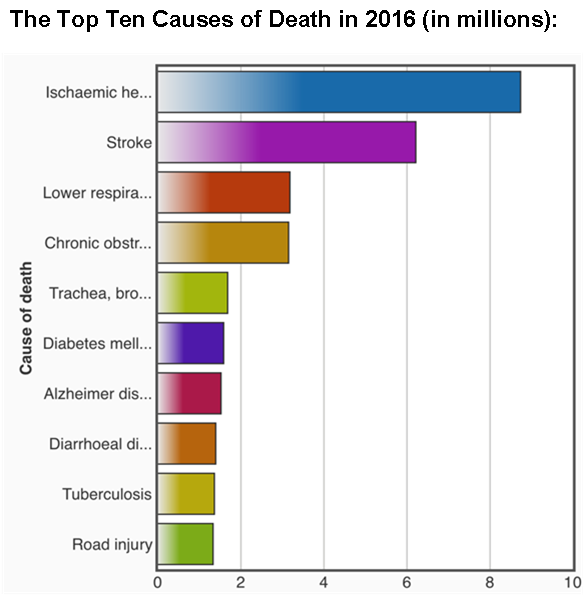Bishop Mike Rinehart
People of faith care about the world that God so loves (John 3:16). Jesus offered a way of justice and peace, calling us to love and pray for our enemies, while teaching his followers to feed the hungry, clothe the naked, welcome the stranger, and visit those who are sick or in prison. This is “The Way,” described in the New Testament.
Jesus traveled the countryside healing people who were sick with leprosy, fevers, blindness, and more. He taught his disciples a kinder engagement of the occupying Roman armies.
So where is God calling us today? Where are the leper colonies and prisons we need to visit? Who are the strangers in need of welcome?
The World Health Organization offers an interesting perspective. Here are the top ten threats to human life.

This information comes from the World Health Organization. Ischemic heart disease and stroke are the top causes of death. Contagious lower respiratory infections accounted for 3.2 million deaths. HIV/AIDS is falling off the top 10 list, but diabetes has come up. Road injury and tuberculosis figure large. Diarrhea, caused most often by a lack of clean water, is an epidemic. Many of the top killers are hunger and poverty related. Too many African countries have an average life expectancy in the 40s. We have work to do.
While armed conflict has been on the rise the last 2-3 years, it still does not come close to making the top ten. You are still four times as likely to die of road injury in this world than in an armed conflict. I haven’t seen rock solid numbers for 2016, but the Armed Conflict Database reported 167,000 deaths in 40 known armed conflicts in 2015, down 13,000 from 2014. With the devastating death toll in Syria, I’m sure that number will be up for 2016, when they publish the numbers. Even so, it will be far from the greatest threats to life in this world. In 2015, there were 429,000 malaria deaths. Malaria is a bigger threat than armed conflict.
Certainly, defeating ISIS is a priority. The horrific nature of their inhumane taking to life is pure evil. They have killed more Muslims than any other religious group. The question becomes, how? The Syrian Civil War is complex, spurred by Assad’s regime. The players are many: Assad’s forces, the resistance, ISIS, Russia, Turkey, Iraq, and the U.S.
What is proposed? Boots on the ground? A devastating attack on Syria, which will ultimately be a recruiting win for ISIS and other extremist groups?
The moral question is much larger than armed conflict. People of good will want less armed conflicts, not more. Battling malaria and HIV/AIDS is as important as battling ISIS, which, by the way, has been losing ground steadily for two years. Note the recent absence of media output from ISIS? The world sees ISIS for what it is. Its days are numbered. Hunger and poverty, though, are here to stay. And one can make a strong case that a considerable amount of global conflict would be averted if people were fed and housed adequately. Warm people with health care and full stomachs don’t want the chaos of war.
War breeds war. Violence breeds violence. Jesus’ message is one of transformation by love. Transform your enemy. Our best plan for this is by showering the world with food, water, medicine, health care, and good will. We dare not cut back on these things. Food, not bombs, will change the game.
Want to make a difference? This year we are raising half a million dollars for ELCA World Hunger. The best thing you can do, to make the world a better place, is serve those in need. The surest way to follow Jesus’ command to feed the hungry, clothe the naked, welcome he stranger, is to get out of our personal bubble, bringing our wealth, time, and influence to bear on the world’s problems.
I invite you to serve those in need here and abroad. Most of you already are. Lent is a great time to recommit to acts of mercy. This year set a goal. Make a commitment. Be a part of our efforts to give $500,000 for the 500th anniversary of the Reformation.
Resources
- Synod Hunger Campaign Brochure
- Synod Hunger Facts
- Placement (Texas and Louisiana)
As of January 31, 2017, our total individual and congregational support for our hunger appeal is at $249,165, which is 49.8% of our goal.
